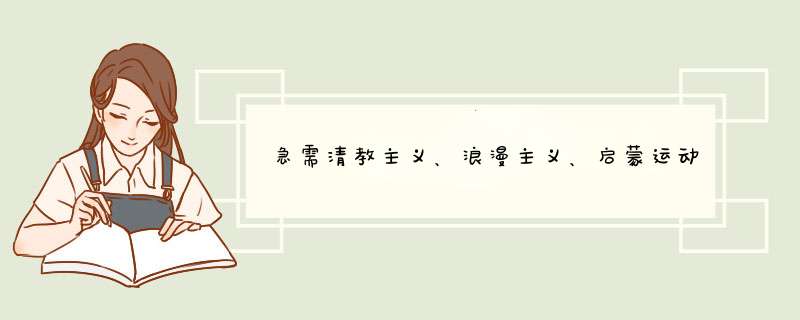
清教主义 Puritanism
浪漫主义 Romanticism
Romanticism was a movement in literature, philosophy, music and art which developed in Europe in the late 18th and early 19th centuries Starting from the ideas of Rousseau in France and from the Storm and Stress movement (狂飙运动) in Germany Romanticism emphasized individual values and aspirations (灵感) above those of society As a reaction (反应) to the industrial revolution (工业革命), it looked to (承上启下) the Middle Ages and to direct contact with nature (与大自然的直接接触) for inspiration (灵感)。 Romanticism gave impetus (动力支持) to the national liberation movement (民族解放运动) in 19th century Europe
启蒙运动 Enlightenment Movement
Enlightement was an intellectual (知识分子) movement originating in France, which attracted (吸引) widespread (普遍的) support (支持) among the ruling (统治阶级) and intellectural classes of Europe and North America in the second half of the 18th century It characterizes the efforts (作用) by certain European writers to use critical reason (批评推理) to free minds from prejudice (偏见), unexamined authority (权威) and oppression (压迫) by Church or State (国家政权)。 Therefore the Enlightenment is sometimes called the Age of Reason (理智的年代)。
启蒙运动宣传的是民主自由平等
让资产阶级对未来抱有美好的幻想,当时,社会黑暗,封建君主专制盛行,浪漫主义文学就是在批判现实主义的同时,在面对黑暗世界的时候,本着启蒙运动宣传的信念,盼望着美好未来。
启蒙运动后所建立的资本主义社会并不符合理性主义所构造的那么完美,各种社会问题仍然存在,人们对未来充满迷茫了,而物质的过于满足导致精神的缺失,产生对此相反映的社会情绪,由此才出现了浪漫主义
18世纪法国的审美理想是在古典主义和启蒙主义的直接影响下形成的,他们奉行“艺术要模仿自然”,“凡是由自然创造的东西没有不正确的”的原则艺术既要根据自然,又要超越自然,艺术美是一种理想美,是艺术家根据自然的素材精心加工出来的结果。启蒙主义者猛烈抨击宫廷芭蕾的浮华纤巧,华而不实的”洛可可“风格,提倡现实主义表演风格。这些思想对后来诺维尔倡导的舞蹈改革也有过重大的影响。18世纪下半叶的法国芭蕾舞台上各种流派同时并存,但主流是保守的,因此受到了狄德罗,卢梭和格林等人的尖锐批评。总的说来,在启蒙主义思想影响下发展起来的欧洲古典芭蕾艺术从艺术风格上说是前浪漫主义的,它孕育着19世纪30年代出露头角的浪漫主义芭蕾的一些特征,在人材上和创作上为后者作了准备。
欢迎分享,转载请注明来源:浪漫分享网

 微信扫一扫
微信扫一扫
 支付宝扫一扫
支付宝扫一扫
评论列表(0条)